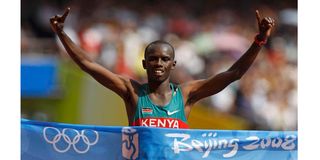Premium
We didn’t find out exact cause of Olympic champion Samuel Wanjiru’s death, investigator tells court

Samuel Kamau Wanjiru gestures as he crosses the finish line to win the men's marathon at the Beijing 2008 Olympic Games in August 24, 2008. The athletics star died under mysterious circumstances at his residence in Nyahururu in 2011.
The puzzle of Olympic marathon champion Samuel Kamau Wanjiru’s death deepened further yesterday after the lead investigator told a Nairobi court that police were yet to establish the exact cause of the athlete’s death more than a decade ago.
Testifying at the closure of the proceedings of a judicial inquest formed seven years ago, Senior Superintendent of police Jacob Kaberi Kanake said various people had given inconsistent and conflicting accounts of the circumstances surrounding Wanjiru’s death at his residence in Nakuru on May 15, 2011.
The investigator said while some witnesses had said Wanjiru died from a fall off the balcony of his house at Muthaiga estate in Nyahururu town, they could not account for blood that was found on the balcony.
Mr Kanake added that no one saw Wanjiru fall or jump from the balcony and no photographs were taken at the scene where the marathoner’s body was found.
The judicial inquest is seeking to establish whether Wanjiru was killed, and if so by whom, or whether he died as a result of an accident.
The inquest also seeks to find out whether the athlete was pushed off the balcony or he wilfully jumped to his death.
Wanjiru is alleged to have jumped off the balcony to his death.
Asked by Chief Magistrate Wendy Kagendo to provide details of the circumstances under which the marathoner died, the investigator said he had no information.
"It is difficult to know what befell Wanjiru because he landed on the floor but had an injury at the back of his head," Mr Kanake said.
The officer added that he did not know what occasioned the injury at the back of Wanjiru's head.
"When I saw the body at the mortuary and saw the injuries, the one at the back disturbed me a lot. So l went back to the scene where Wanjiru had fallen to try and find out what had caused the injury," the officer explained.
At the mortuary, Mr Kanake added, it was further discovered that blood was oozing blood from his mouth and nose. He was also bleeding at the back of his head.
When he arrived at the Nyahururu hospital, the doctor told him Wanjiru was dead.
“I asked him (the doctor) to turn the body around. I checked it for injuries and saw bruises on his hands, legs and back of his head. He did not have any broken limbs,” said Mr Kanake.
The investigator said he immediately left the hospital and went to the scene where the body had been found to establish whether other people could have been involved in the death.
Upon arrival at the scene, he found two police constables. He inspected the scene and found some blood on the balcony.
He then went on to interrogate the persons who were in the home compound, including Ms Jane Nduta, two police officers and the watchman.
He told the court that he wanted to know whether anyone could have hit Wanjiru on the head.
However, he did not get any conclusive evidence apart from the conclusions drawn by the doctors and pathologists.
“Nobody saw him fall. Ms Nduta was inside the house while Ms Triza (Njeri) was leaving the compound,” said Mr Kanake.
Asked by the court if there could have been a conspiracy between the two women (Ms Nduta and Ms Njeri), Mr Kanake stated that that would not have been possible as the two were not friends.
The court had also sought to know from the officer what exactly killed Wanjiru as evidence by government doctors and pathologists tabled in court showed the marathoner was hit with a blunt object, leading to his death.
The doctors said the injuries on Wanjiru's head were inconsistent with a fall, maintaining that he was assaulted before he died.
The officer further explained that there were inconsistencies in the testimonies of Ms Nduta, Ms Njeri and former Nyandarua North OCPD Josephat Ombali on what happened on the day Wanjiru died.
The court heard that Ms Njeri recorded many statements that were found to be inconsistent and defensive.
The officer further told the court that he rescued Ms Nduta, who was locked in Wanjiru's bedroom by Ms Njeri after a fight broke out between them.
The court heard Ms Nduta had been in the bedroom with the marathoner.
"When l arrived at the scene I found Ms Nduta on the balcony. She was also trying to jump off and I pleaded with her not to. We then broke the padlock on the bedroom door using a metal rod," said Mr Kanake.
He said that after interrogating Ms Nduta as to why she had gone to a married person's house, she responded that she was Wanjiru’s girlfriend and a bar attendant in Nyahururu.
"She told me that Wanjiru had called her and informed her that his wife was not around and it was okay for her to go to the house," the officer stated.
It also emerged that Wanjiru’s mother was restrained from attending her son's funeral on grounds that she was violent and there was an order barring her.
However, the officer did not reveal who had issued the directive restraining Wanjiru’s mother from attending her son’s funeral.
The prosecution closed the inquest, which started in 2015 and in which 30 witnesses have testified. The court is expected to set the date of the ruling.


